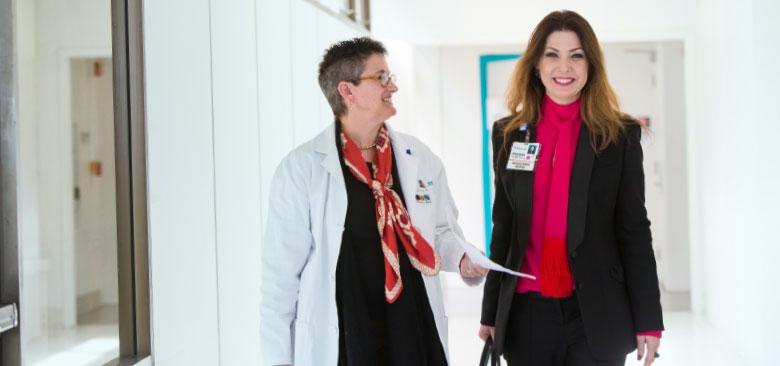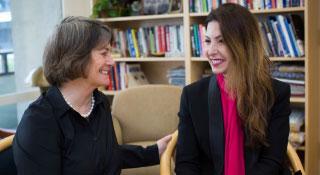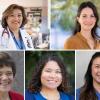
Tina Mammone (right) with Daphne Stannard, director and chief nurse researcher at UCSF Health's Institute for Nursing Excellence (photos by Elisabeth Fall)
An Accomplished Alumna Returns “Home”: Tina Mammone Takes Charge at UCSF Medical Center
After nursing around the world in a variety of hospital settings, Tina Mammone (MS ’06, PhD ’14) arrived at UCSF Medical Center in 2002. Over the next 13 years, she progressed through numerous leadership positions, while earning her master’s and doctoral degrees from the UC San Francisco School of Nursing. She left to take a job as chief nursing officer at the University of Virginia Health System, but returned in March 2017 to become vice president and chief nursing officer at UCSF Medical Center, where she is responsible for, among other things, nursing practice at UCSF Helen Diller Medical Center at Parnassus Heights and UCSF Medical Center at Mount Zion, UCSF Benioff Children’s Hospital San Francisco and Langley Porter Psychiatric Hospital and Clinics. A nationally recognized nursing leader, Mammone is a member of the American Organization of Nurse Executives, the American College of Healthcare Executives, Sigma Theta Tau and the Association of California Nurse Leaders.
Almost one year since her return to UCSF, we spoke with Mammone about her return and her ambitious agenda for nursing care, education and research.
What brought you back to UCSF?
UVA Health System in Charlottesville, Virginia, was a wonderful place, but I was at UCSF for 13 years; it’s my home. There is something really special about this place – a unique spirit and drive for excellence in nursing. The nursing staff is so inquisitive, so engaged in evidence-based practice and invested in a healthy working environment; there is so much passion to constantly surpass benchmarks, to better serve communities and each other, so when the opportunity came, I couldn’t let it go.
What have your initial priorities been in your first year on the job?
I had five priorities when I arrived and they remain at the top of my list.
Number one is to empower the nursing staff and our interprofessional colleagues, such as respiratory therapists and dietitians, by continuing to integrate the principles of shared governance. That is an important tenet of Magnet organizations. [UCSF Medical Center and UCSF Benioff Children’s Hospital San Francisco have earned Magnet Recognition from the American Nurses Credentialing Center. The designation acknowledges excellence in nursing, quality of patient care and innovations in professional nursing practice. Only 8.6 percent of the more than 5,500 hospitals registered with the American Hospital Association have achieved Magnet Recognition. UCSF is the only hospital in San Francisco to hold this distinction.]
Number two is to continue building a nursing culture where we use evidence to support clinical practice and evidence-based management at all nursing levels – including administration – to improve the quality of care, optimize our outcomes and enhance support for our patients and patient-centered care.
Number three is to promote nursing development and succession planning. There is a nursing shortage in many specialties, and it’s become harder to recruit. So while we need to be competitive and continue to bring in outside talent, we also need to engage in thoughtful mentorship and internal development, so we can promote our own people up the career ladder. There are more than 3,500 very talented nurses at UCSF, and it’s important that we develop the next generation of nurse-leaders here.
 Dean Catherine Gilliss with Mammone Number four is to leverage technology to promote innovative solutions for communication and evidence-based care. We don’t necessarily need to work harder in many cases, but we do need to work smarter by drawing on innovations like those that might emerge from Dr. Mortara’s new center [the UCSF Center for Physiologic Research] at the School.
Dean Catherine Gilliss with Mammone Number four is to leverage technology to promote innovative solutions for communication and evidence-based care. We don’t necessarily need to work harder in many cases, but we do need to work smarter by drawing on innovations like those that might emerge from Dr. Mortara’s new center [the UCSF Center for Physiologic Research] at the School.
And number five is to strengthen our partnership with the School of Nursing and other nursing schools in the area. We have an academic mission to teach and perform research, and I am especially excited to work with Dean Gilliss. I was a member of the search committee [to find a new dean], and I am thrilled that she chose to come to UCSF.
How do you envision the partnership with the School of Nursing?
We are identifying and collaborating on shared initiatives that help us achieve our mutual goals. For example, we are moving to accredit our NP fellowship, with Mitchel Erickson (MS ’98), our director of advanced practice nursing, working with Janine Cataldo and others from the School to make this happen. It’s an exciting program in which up to three new NPs get a residency year at the medical center to better prepare them for full-time practice.
We also envision working with Dean Gilliss to help create a larger menu of academic programs at the School to meet our staffing needs. That work is just beginning.
And, of course, as a Magnet hospital, there are plenty of opportunities for research and innovation on both sides. We have a duty and we have the talent to develop nursing science here and to share our results. I did my doctoral research at the medical center, and I believe in supporting the School as much as I can in these kinds of research efforts.
What is the current climate for advanced practice nurses at UCSF Medical Center?
There is an insatiable thirst for advanced practice providers: nurse practitioners, certified registered nurse anesthetists, certified midwives, clinical nurse specialists and physician assistants. As UCSF Health has expanded, we have nearly 400 advanced practice nurses and other advanced practice providers in a variety of settings, and we can’t seem to hire them fast enough. Academic medical centers like ours are under a lot of pressure to improve access and care, so we are increasingly turning to our advanced practice nurses and providers to provide care and to support patients in the ambulatory, procedural and inpatient settings.
Our focus has been on both recruitment and retention, but I’d really like to shift away from recruitment – and focus our energy more on retention. That’s why I’m so focused on creating a healthy work environment for all of our nurses and team members, and why we are working to enable our registered nurses and advanced practice nurses to work to the full scope of their licensure.



